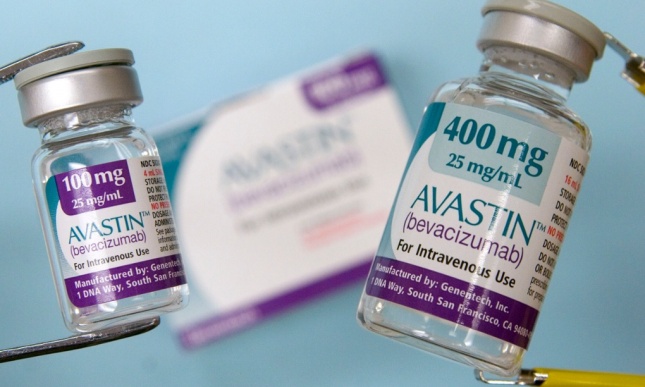
Avastin, primarily a bowel cancer drug, is similar to Lucentis but 40 times cheaper when split into tiny doses to be injected in the eye. Photograph: Bloomberg/Getty Images
Sarah Boseley Health editor
All countries should make available a cheap, unlicensed drug to prevent blindness in older people – one in preference to the expensive licensed version promoted by pharmaceutical companies, a World Health Organisation committee has ruled.
The WHO’s essential medicines committee has rejected an application from Novartis to have the expensive licensed drug Lucentis added to the list of drugs all countries should stock (PDF). The decision is a blow for the pharmaceutical companies that have been fighting the growing use of Avastin for age-related wet macular degeneration. Avastin, primarily a bowel cancer drug, is similar to Lucentis but 40 times cheaper when split into the tiny doses to be injected in the eye.
The decision will bolster the case of those, like the NHS clinical commissioners, who are pressing for Avastin to be widely available in the UK, potentially saving the health service millions of pounds a year. The two drugs are made by the same company, Genentech, owned by the Swiss giant Roche, which has declined to seek a licence for Avastin to prevent blindness. Novartis markets Lucentis in Europe.
Critics accuse the companies of blocking access to a cheap drug that could slow or prevent blindness in millions of people around the world. Around 40,000 people a year develop wet AMD in the UK, according to the Macular Society. The potential NHS bill for Lucentis is huge. A head-to-head trial called IVAN, which was funded by the UK government, found that two years of Lucentis treatment cost over £18,500 compared with £3,000 for Avastin.
IVAN found the drugs work equally well, but because it does not have a licence for use in eyes, Avastin can only be prescribed by individual doctors prepared to do it on their own responsibility.
In 2013, the WHO put Avastin for macular degeneration on its list of essential medicines that every country should be able to offer its people. Novartis then requested Lucentis be considered for inclusion. But the WHO has declined. The latest edition of the essential medicines list, just published, includes Avastin (generic name bevacizumab) but not Lucentis (ranibizumab).
Prof John Harris, director of the Institute for Science, Ethics and Innovation at the University of Manchester said the WHO committee had made the right decision.
“Research has demonstrated that Avastin is as effective and as safe as Lucentis but at a fraction of the cost – there can be no justification for listing the more expensive and no better alternative.
“Novartis are wasting their money and patient’s and public money, and risking the sight of many patients who cannot afford Lucentis, by attempting to market Lucentis as an alternative to Avastin when there is no significant clinical advantage to patients.”
Julie Wood, director of the NHS Clinical Commissioners – the membership organisation of the groups across the country that commission healthcare – said it was helpful to their case that Avastin and not Lucentis was on the WHO essential medicines list.
“We’re trying to overcome some of the barriers that are around,” she said. That included advice from the General Medical Council that if there are two drugs that are equally effective, doctors should prescribe the licensed one.
The commissioners were most persuaded by the recent independent Cochrane review of the evidence for the two drugs, which said Lucentis was not superior. “That was a bit of a sea change for us,” she said. “That was a Cochrane review, independent of everything else, concluding that Avastin is of comparable efficacy and safety. From our point of view, that is good enough.”
Nice, the National Institute for Health and Care Excellence, which recommends which treatments the NHS should use, cannot appraise an unlicensed medicine unless the Department of Health asks it to do so. It can, however, recommend which drugs should be used in a treatment guideline – and it is now preparing one on macular degeneration.
